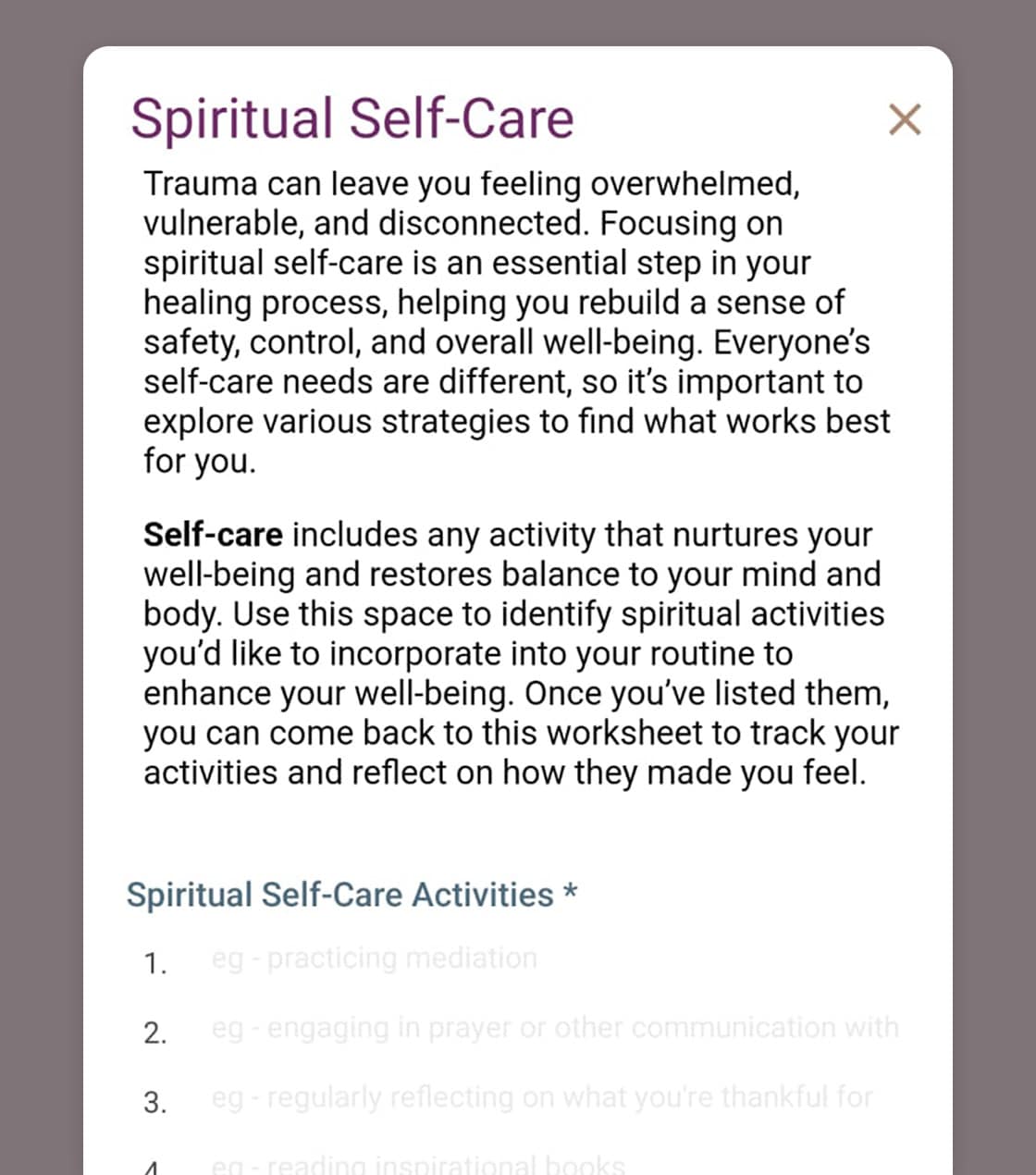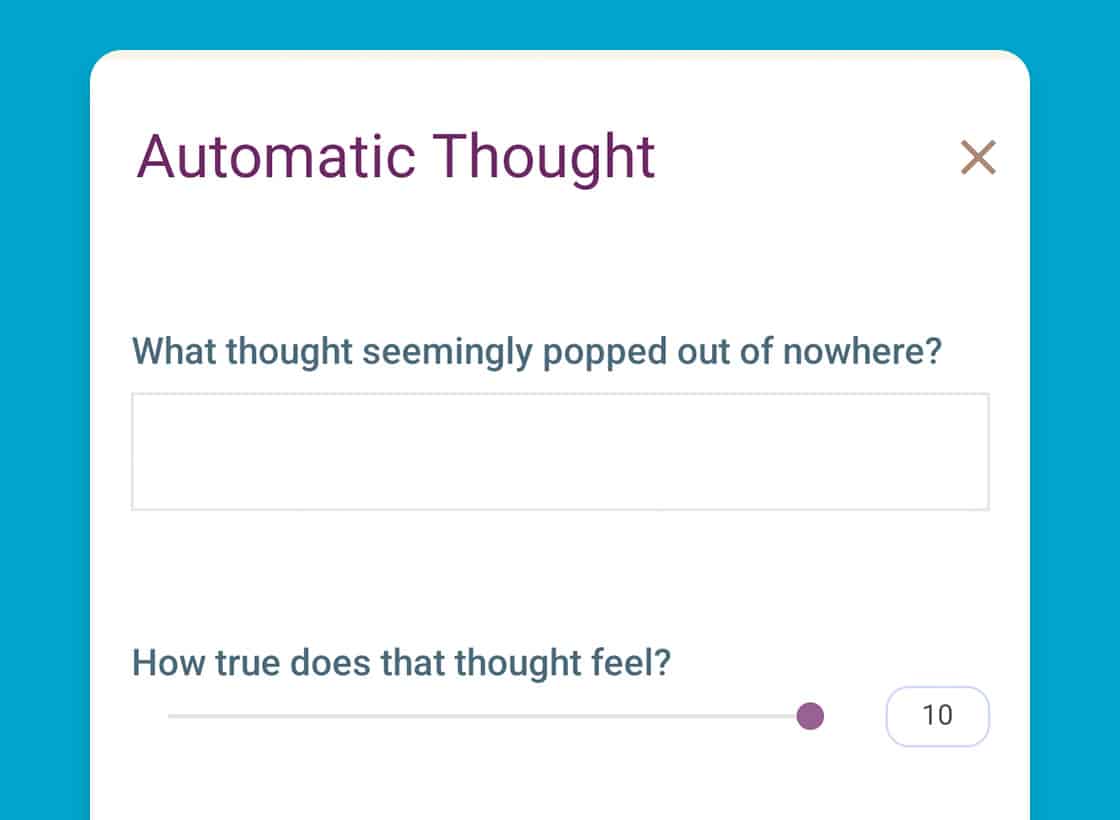Spiritual Self-Care
Template by Reflective
Best for OCD Anxiety Depression PTSD CBT ACT Trauma Eating Solution Focused
The “Spiritual Self-Care Assignment” is a thoughtful tool designed to help clients explore and nurture activities that connect them to their sense of purpose, values, and inner peace. Whether through practices like mindfulness, meditation, nature walks, prayer, or creative expression, this assignment encourages clients to identify spiritual self-care activities that resonate with them and track how they feel before and after engaging in these practices. Ideal for modalities such as Acceptance and Commitment Therapy (ACT), Positive Psychology, and Trauma-Focused Therapy, this assignment supports clients in cultivating resilience, meaning, and a deeper connection to themselves and the world around them.
Share the Spiritual Self-Care assignment with your client
Share the Spiritual Self-Care worksheet with your patient with the Reflective app so they can do the work between sessions. Simply enter their email, and they’ll be able to fill in the worksheet from the convenience of their phone. Get started for free!
How does Reflective work?
Share exercise with client via Reflective
Client receives email with app link and connection request
Client clicks link to download app
Client accepts your connection and exercises you shared
Client uses app to fill in exercises, gets reminders
Table of Contents
- Introduction
- The History of Behavioral Activation
- Behavioral Activation Across Modalities
- What Disorders Benefit from Behavioral Activation?
- Spiritual Self-Care: The Missing Piece in Behavioral Activation
- How to Integrate Behavioral Activation into Practice
- Using Reflective for Spiritual Self-Care
- Addressing Therapist Self-Care
- Conclusion
Behavioral Activation and Spiritual Self-Care
Behavioral Activation (BA) is a therapeutic approach that encourages clients to engage in meaningful activities to improve their mental health. While it is often associated with treating depression, its principles can be adapted to a variety of contexts. One area where BA can have significant impact is in fostering spiritual self-care, an often-neglected but critical aspect of holistic well-being.
Therapists are uniquely positioned to guide clients in integrating spiritual self-care into their behavioral routines. This article will explore the origins of Behavioral Activation, its application across therapeutic modalities, the types of challenges it addresses, and practical strategies for incorporating spiritual self-care into your work with clients. Additionally, we’ll discuss how Reflective, a client engagement tool, can support therapists in delivering personalized spiritual self-care interventions.
The History of Behavioral Activation
Behavioral Activation was initially developed in the 1970s as part of Cognitive Behavioral Therapy (CBT). It was designed to help individuals overcome depression by reducing avoidance behaviors and increasing engagement in rewarding activities. The premise is simple but effective: meaningful action leads to improved mood and mental health.
Over time, researchers found that the behavioral strategies of CBT were highly effective on their own. Jacobson et al. (1996) demonstrated that BA could function as a standalone treatment for depression. Today, BA is recognized as an evidence-based intervention with applications across a wide range of conditions and therapeutic approaches.
For further insights, consider reading Behavioral Activation: Distinctive Features by Jonathan W. Kanter, Andrew M. Busch, and Laura C. Rusch.
Behavioral Activation Across Modalities
Although Behavioral Activation originated within CBT, its principles align with several other therapeutic frameworks:
- Acceptance and Commitment Therapy (ACT): BA complements ACT by helping clients engage in value-driven actions despite experiencing difficult emotions.
- Dialectical Behavior Therapy (DBT): BA integrates well with DBT’s emphasis on building a life worth living, particularly through activities that promote mastery and pleasure.
- Trauma-Focused Therapy: For trauma survivors, BA can provide a sense of structure and purpose, while spiritual self-care helps clients process existential questions and rebuild a sense of connection and meaning.
By integrating BA with these modalities, therapists can address both behavioral and existential challenges, providing a comprehensive approach to client care.
What Disorders Benefit from Behavioral Activation?
Behavioral Activation is a versatile intervention that can address a variety of mental health challenges:
- Depression: BA disrupts the cycle of inactivity and low mood by encouraging clients to re-engage with activities that bring mastery and fulfillment.
- Anxiety: For clients struggling with anxiety, BA helps reduce avoidance behaviors, enabling them to face fears and regain confidence.
- Post-Traumatic Stress Disorder (PTSD): BA aids trauma survivors in restoring routines and creating meaning in their lives. Spiritual self-care can address deeper existential disruptions often caused by trauma.
- Burnout and Life Transitions: Whether clients are navigating grief, career shifts, or caregiving responsibilities, BA offers a pathway to reclaim balance and purpose.
Spiritual Self-Care: The Missing Piece in Behavioral Activation
While Behavioral Activation emphasizes action, integrating spiritual self-care ensures that these actions align with a client’s deeper values and beliefs. Spiritual self-care involves practices that nurture one’s sense of connection, purpose, and meaning—factors that profoundly influence mental health.
Strategies for Spiritual Self-Care:
- Exploring Spiritual Practices: Encourage clients to identify and engage in activities that resonate with their spiritual values, such as meditation, prayer, or time in nature.
- Building Community Connections: Support clients in finding communities that reflect their spiritual or philosophical beliefs, whether through faith-based groups, volunteer organizations, or spiritual retreats.
- Fostering Reflection and Gratitude: Introduce practices like journaling or gratitude exercises to help clients deepen their understanding of themselves and their place in the world.
Reflective can enhance spiritual self-care by offering resources such as guided meditations, personalized journaling prompts, and psychoeducational tools on spirituality and mental health.
How to Integrate Behavioral Activation into Practice
Incorporating BA into your practice is straightforward and highly adaptable. Here’s how you can begin:
- Identify Avoidance Patterns: Work with clients to pinpoint the behaviors or situations they are avoiding. Reflective’s tracking tools can help you gather this information effectively.
- Develop Value-Driven Plans: Collaboratively create schedules that incorporate meaningful activities, including those focused on spiritual self-care.
- Leverage Reflective for Support: Use Reflective to provide psychoeducation, send reminders, and track progress. Exercises such as gratitude journaling or mindfulness practices can be easily integrated into client plans.
- Monitor and Adapt: Regularly review which activities are most effective for the client. Reflective’s data insights can help you make informed adjustments to their plans.
Using Reflective for Spiritual Self-Care
Reflective includes a specialized exercise designed to help clients integrate spiritual self-care into their lives. Through this feature, clients can:
- Plan Activities: Clients can list spiritual practices they want to try or maintain, such as mindfulness, attending spiritual gatherings, or journaling.
- Track Their Impact: Each time clients engage in these activities, they can record how they felt before and after, providing valuable feedback for both them and their therapist.
- Access Complementary Resources: Reflective offers psychoeducational content and meditations that align with spiritual self-care practices, ensuring a holistic approach to client well-being.
This approach empowers clients to take ownership of their spiritual growth while giving therapists tools to track and enhance their progress.
Addressing Therapist Self-Care
Therapists often model the practices they recommend to clients. By integrating spiritual self-care into your own routine, you can better understand its benefits and challenges.
Reflective can help alleviate administrative burdens, freeing up time for your own self-care. Automating routine tasks like session follow-ups and progress tracking allows you to focus on maintaining your own sense of connection, meaning, and balance.
Conclusion
Behavioral Activation becomes even more effective when paired with spiritual self-care, offering clients a pathway to reconnect with their values and sense of purpose. By leveraging tools like Reflective, therapists can create customized plans that foster both action and deeper self-awareness, ensuring lasting and meaningful progress.
Begin integrating Behavioral Activation and spiritual self-care into your practice today. Reflective’s features can help you streamline this process, giving you more time to focus on what matters most—helping clients thrive.



